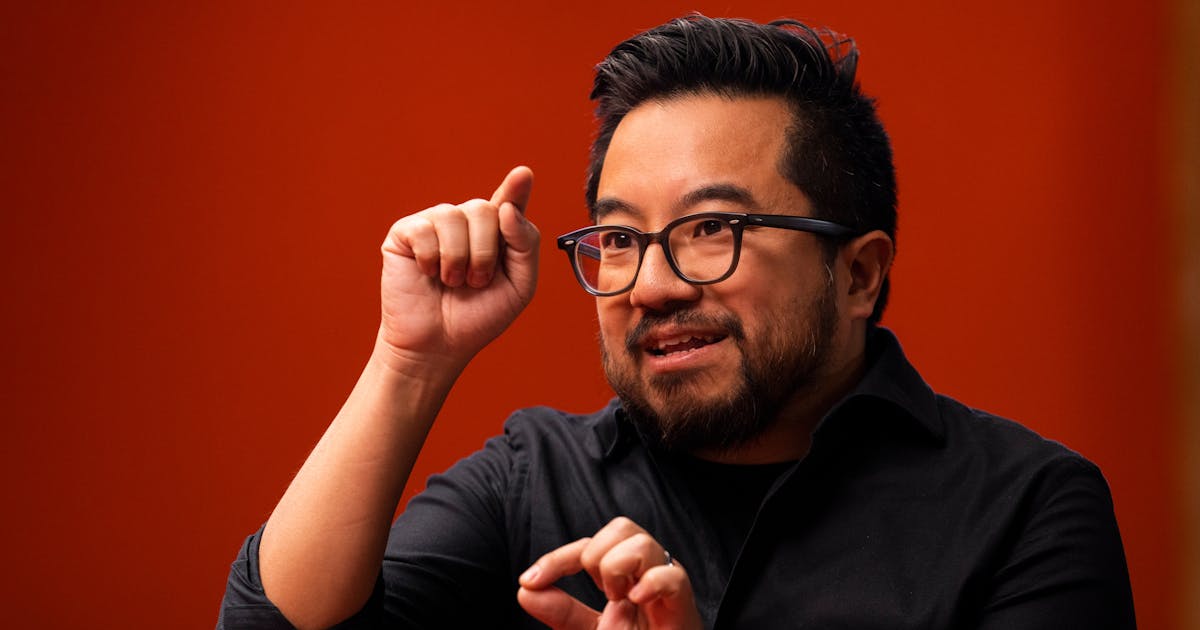Psst, New York Times. The Network State cult hates you

What if [A.G.] Sulzberger is more like Keyser Söze? What if his employees are highly self-interested professional prevaricators? What if they've always been like that? – Balaji Srinivasan, "The Network State."
The point: The New York Times profiled Y Combinator CEO Garry Tan, but failed to mention his affiliation with the Network State cult — which sees the NYT (and most newspapers) as a bastion of "highly self-interested professional prevaricators." But the Network State cult is an essential part of the Garry Tan story. It's impossible to understand his politics without understanding this fast-emerging tech billionaire ideology: the Network State.
Backstory: Two months after his infamous Twitter meltdown, Garry Tan finally got a story in the New York Times. Tan is the tech CEO currently spearheading a billionaire-funded effort to take control of San Francisco City Hall in the 2024 elections. In January, he gained national infamy after a drunken Twitter rant in which he wished a slow death on progressive leaders.
Last week's NYT piece by Heather Knight was about as favorable as it could be, given that its subject had publicly issued drunk death threats to elected officials. Tan did his best to seem uncharacteristically contrite and humble. Aw shucks, I'm just a very passionate centimillionaire who wants to buy the local government and create a different future.
But what does that future look like? The story accepts the framing that Tan is a “moderate” who favors “common sense” policies. But there’s a deeper story here, and it involves overthrowing the NYT's credibility and influence.
The 'Network State' in a nutshell
If you're already familiar with Tan and his connection to the Network State cult, feel free to skip down to the Network State vs NYT section farther down the page.
If you're new to this conversation: Tan is one of the most outspoken members of something called the Network State movement. This is essentially a tech billionaire cult that seeks to build sovereign mini-nations ruled by ... tech billionaires. For an extended primer, here's what I wrote in the New Republic:

Garry Tan and The Network State, via New Republic
The main idea: Instead of being citizens of countries like the United States, wealthy techies can instead choose to become citizens of sovereign new mini-nations created around their interests. This would allow them to avoid taxes and live according to the rules of tech billionaire corporation nations. (As with many tech ideas, this is just a revised version of an old concept. See: communes and company towns.)
It sounds kooky, but this cult has been quietly growing for years. It has big-name tech backers like Marc Andreesen and Peter Thiel. And now it’s moving aggressively into the public sphere. Last October, the cult hosted its first conference, the Network State conference in Amsterdam.
Tan delivered a speech there. He explicitly connected his efforts to buy San Francisco City Hall to the Network State idea. Specifically, he highlighted recent efforts to build “parallel” political institutions and media outlets here. (He pointed to Elon Musk’s Twitter as an example of a successful "parallel" media outlet…which doesn’t seem very “moderate” given Musk’s turn toward hard-right toxic conspiracy and ideology.)
You see, while the Network State cult mostly focuses on creating new sovereign territories, it also recommends an alternative: Taking over existing governments and institutions to bring them under tech billionaire control. This is what Tan has in mind in San Francisco – as he has made clear in many speeches and YouTube videos over the past few years. Here's a video of Tan talking about his grandiose plans to take over the rest of the world after he's done in S.F.
"Because if we can build here, we can take over the whole country – we're going to take over every nation in the world," he says.
It sounds ridiculous, but the tech billionaires are spending tons of money to turn the Network State idea into a reality. They’re laying the groundwork for their sovereign territories all over the world — in Africa, Latin America, the Mediterranean, and right here in the United States.
These efforts have garnered scattered attention from the press, mostly as an item of curiosity: Look at those zany tech bros and their oddball ideas. What the press doesn’t seem to understand (yet) is that the Network State cultists aren’t joking.
They take this very seriously. They’re working to disrupt the very idea of nationhood and citizenship by creating a network of sovereign global territories protected by military grade security. They plan to use their massive wealth to reshape the balance of power in their favor – permanently.
And they’re willing to crush anyone who gets in their way.
Tech billionaire lawfare
For example: In Honduras, the Network State cultists behind a planned city called Prospera are currently suing the Honduran government for $11 billion for blocking the project. In California, the investors behind the Andreesen-backed California Forever – a proposed tech "utopia" in rural Solano County – are suing local community members for $500 million because they refuse to sell their property to billionaires.
The Network State is no longer a fever dream in a tech nerd podcast. The NS cult is making big moves. It's a global campaign, backed by billionaires, to execute colonialist power grabs all around the world.
And the press must start paying close attention. Because the NS cultists don’t just want to get rid of nations. They want to get rid of the mainstream media as well.
Their biggest target: The New York Times.
Network State vs NYT
Balaji Srinivasan — a former Andreesen-Horowitz partner who is the key thinker behind the Network State — wrote an entire book outlining the idea (which is basically a form of high-tech secession).
Helpfully, the book is totally free to read online. Srinivasan even goes so far as to provide one-paragraph and one-page summaries of the idea. Here’s the one-paragraph summary:
A network state is a highly aligned online community with a capacity for collective action that crowdfunds territory around the world and eventually gains diplomatic recognition from pre-existing states
In the book Srinivasan lays out his deeper philosophy. In a nutshell, Democratic society has failed because of things like feminism, progressivism, “wokeness” (you get the picture). Behind all of this, writes Srinivasan, is a key institution that seems to exert a control over everything: the NYT.
Writes Srinivasan:
Today’s world is becoming tripolar. It is NYT vs CCP vs BTC. That’s the American Establishment vs the Communist Party of China vs the Global Internet.
Srinivasan defines the NYT in terms of a specific ideology:
Woke Capital is the ideology of America’s ruling class as explicated by America’s ruling newspaper, The New York Times. It’s capitalism that enables decentralized censorship, cancel culture, and American empire. It’s drone-strike democracy.
He expends a lot of energy on personal attacks against A.G. Sulzberger, the publisher of the New York Times, whom he depicts as a “rich white male nepotist.” He also unleashes on the entire Ochs-Sulzberger family (which owns the NYT):
...If you know a bit more about history, you’ll know that the New York Times Company (which originates so many of these jeremiads) is an organization where the controlling Ochs-Sulzberger family literally profited from slavery, blocked women from being publishers, excluded gays from the newsroom for decades, ran a succession process feating only three cis straight white male cousins, and ended up with a publisher who just happened to be the son of the previous guy.
He goes on:
So long as you aren’t running a corporation based on hereditary nepotism where the current guy running the show inherits the company from his father’s father’s father’s father, you’re more diverse and democratic than the owners of The New York Times Company. You don’t need to take lectures from them, from anyone in their employ, or really from anyone in their social circle – which includes all establishment journalists.
And on:
What if Sulzberger is more like Keyser Söze? What if his employees are highly self-interested professional prevaricators? What if they've always been like that? What if you can't trust anything they say, and by extension, anything the US establishment says, without checking it yourself?
There’s more … but suffice it to say that Srinivasan despises the NYT. He sees it as the key institution standing in the way of his cult.
His solution: Use tech wealth to fragment and undermine the existing media establishment. This can be done by attacking the credibility of existing outlets while using tech wealth to create alternative outlets to push an alternative version of reality – one friendly to the crypto bro crowd’s interests.
It’s a simple fragment-and-conquer formula that's already well under way:
- Use tech wealth to undermine existing media outlets and create self-serving versions.
- Use tech wealth to undermine existing governments and create self-serving versions.
- Use tech wealth to create a world controlled by tech zillionaires rather than established governments.
“Blues lose,” said Srinivasan on a recent podcast, explaining how the "blue" Democratic Party and its liberal worldview will be destroyed in the paradigm he envisions.
"Balaji has the highest rate of output per minute of good new ideas of anybody I've ever met, and The Network State may be his best," said Andreesen in a blurb for Srinivasan's book.
"I legit believe [Y Combinator] is a prototype model for what @balajis talks about when he says the Network State," wrote Tan.

Garry 'Network State' Tan
To recap: Srinivasan is the leading luminary of the Network State cult, and Garry Tan is one of the cult's most active and visible promoters. Tan has squarely framed his political efforts as part of the Network State movement.
Given his key role in the NS cult, it seems strange that this affiliation would go unmentioned in any piece about his political activities.
This is not a criticism specific to Knight. Very little of the press coverage of what's happening in SF (and Solano County) mentions the Network State or the fact that the NS cult is spending heavily to influence our politics in very specific ways.
Yet people like Tan are shouting from the rooftops that this is exactly what they're doing. One must willfully overlook the connections to not see them at this point.
But there's a tendency in the political press to cover things in a one-dimensional way. One side says this, they other side says that. An expert weighs in with light criticism. There is left, there is right, there is middle. A tidy, balanced narrative of conflict, etc. The complexities and details of ideology often get ignored altogether (Tan also proudly labels himself a member of the Effective Accelerationism (e/acc) tribe, another cult designation unmentioned in most stories).
But the Network State is something new and extreme. That's probably why journalists are wary or unsure of how to cover it. The whole things sounds like conspiracy theory – until you do the research and realize that the NS cult has books, conferences, podcasts, videos ... and well-funded political campaigns unfolding right here in Northern California, including in San Francisco.
Perhaps Srinivasan's attacks on the NYT will make it clear to journalists who these people really are. After all, isn't it every good journalist's dream to work at the distinguished NYT? But as Srinivasan makes clear, there won't be a role for real journalists in the Network State world. All "journalism" will serve tech dictates and interests. (See their current attacks on the San Francisco Chronicle, which I wrote about yesterday.)
There are legitimate reasons to criticize the press. Journalists make mistakes, and big journalistic institutions can be slow to catch on to what's really happening. The left often criticizes the NYT as an organ of the right, while the right accuses it of being a tool of the left. Debate and criticism are a critical part of journalism.
But Srinivasan and his ilk do not offer constructive criticism. They don't want to make journalism better or stronger. They want to replace existing media – and existing governments – with parallel versions that serve them. This is the core idea of the Network State cult. And Garry Tan is playing a central role in the project.
From Knight's piece:
Mr. Tan has tried to learn from his online mess — or says he has. In person, he speaks kindly and calmly and smiles often, frequently bowing to people while making a prayer gesture with his hands.
From Garry Tan, writing on Twitter last night about Knight's former employer, the SF Chronicle:
SF legacy media is dishonest and lies to you.
Conclusion: Tan has made it exceedingly clear that his current political efforts in San Francisco are part of the Network State movement. Journalists who fail to inform their readers of this context will later appear to have missed the most important part of the story.
Further Readings/Audio on The Network State:

California Forever, a Network State project in Northern California


Excellent review of Quinn Slobodian's "Crack Up Capitalism."

My KQED interview about Garry Tan and the Network State







Comments ()